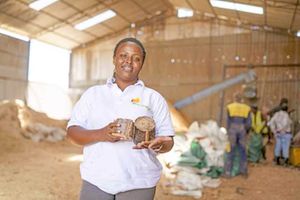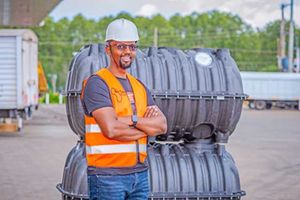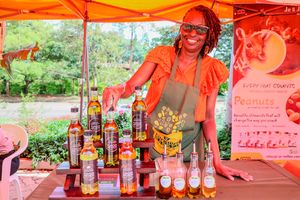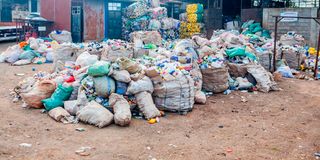
A wide view of Neat World Recycling Plant in Limuru pictured on May 26, 2025.
About 2 kilometres on a dusty road from Limuru town on a half-acre plot of land, John Mwangi Ruoho is seated in a boardroom next to an office kitchen running fully on biogas produced at his solid waste management facility.
“If you have time, you will take tea made on a stove that runs on biogas,” he jokes.
Mwangi, 44, is the CEO of Neat World Services, a leading non-hazardous waste collection company dedicated to promoting environmental sustainability and responsible waste management practices.
In college, Mwangi studied a diploma in Civil Engineering, a discipline, he says, had one unit that laid the foundation for his green enterprise.
“I studied at the Technical University of Kenya—then referred to as the Kenya Polytechnic. While there, I did a unit on environmental management that would many years later come to inspire the formation of Neat World. Services,” he says.
His proper introduction to waste management was during his college days.
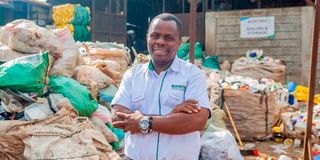
John Mwangi Ruoho at his recycling plant in Limuru pictured on May 26, 2025.
“I joined this business as a means to an end. I was employed to do cleaning overnight in exchange of a scholarship for an ICDL course I did on the side,” he explains.
Years later he would take a driving job at an engineering firm in the city.
As a driver he noticed a business opportunity.
“I discovered a gap for a service I didn’t know existed — post construction cleaning. Before handing over of a construction project, there is usually a lot of cleaning that takes place. Removal of debris from floors and other surfaces cleaning. I approached the supervising company with the concept of organised post-construction cleaning. In one weekend, I made almost the same amount of money I made in a month as an employee.”
He then got a job to clean a building that had been cleaned by someone else three times yet there were still gaps.
“When we did the work, the owner asked the contractor why they hadn’t cleaned the way we cleaned it the first time. We were asked to take over the cleaning of the building going forward. And that’s how I got to register my company and also got my first three employees.”
While still employed, his business grew, eventually employing about 40 workers.
“I decided to transition to business fully as a cleaning company, but then when I came out here, I discovered that people want an amalgam of both a cleaning and waste solid management company.”
He subcontracted someone to handle the waste management company.
“After working with them for one year, there was great disappointment. I decided to in-house it. I went to my Sacco, borrowed some money and bought my first track.”
Neat World Services then operated a linear model. Their work was to collect the waste and take it to the landfills in Dandora, but as business grew, Mwangi was triggered by something he had witnessed in the dumpsites.
“I saw women with children trapped on their backs and young children sifting through what we had brought looking for waste material they could resell. I began also thinking about the impact the waste had on the environment.”
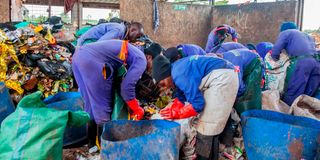
Workers sorting out garbage at Neat World Recycling Plant in Limuru on May 26, 2025.
These two factors inclined him towards waste management. The company still offers cleaning services headed by Mwangi’s co-director, but his passion has been waste management. He went on to research on how waste management is done in other countries and how he could modernise and dignify it.
In 2020, he set up a different business model.
“Even before the Sustainable Waste Management Act, 2022 commenced, Neat World Services was running the circular model recommended by the Act—“90 percent of our business is in Nairobi, even though we operate in Kiambu County. We only came to Limuru because this is where land was available and affordable. All our waste ends up here, the only thing that leaves this facility after collection are the recyclables.”
The company has a material recovery facility that is strategically established on-site to efficiently process collected waste.
“By employing this model, we have been able to significantly reduce the impact the waste has on the environment by ensuring we have a proper waste disposal mechanism. From the facility, we recover valuable recyclable material from dry waste which we sell to trusted recyclers.”
They contribute to the circular economy by reducing the burden on landfills and minimising environmental pollution. They achieve this by segregating the waste collected from the larger metropolis—where they are licensed to operate—into two large batches: organic and inorganic waste.
“Organic waste consists of all the food trimmings and remains we collect from our clients. We collect that into a heap, where our staff begin the process of ‘cleaning’ it. ‘Cleaning’ means we remove anything inorganic that may have found its way to the waste. We leverage our innovative composting technique to recycle the waste into nutrient-rich organic fertiliser.”
Their sustainable approach in handling organic waste not only diverts it from dumpsites and landfills, but also creates a valuable resource for agriculture and soil health enhancement.
“We have started selling this as a product and I am happy to say, we are not only collecting waste, but we also make a product from it.”
The inorganic waste is taken through several stages of sorting, segregation, compression and baling, awaiting collection by recyclers.
“The facility is a beehive. All the segregation and isolation happen simultaneously. We have a workforce of 18 people on-site and about 20 working with the five trucks we send out every day. We have different categories of organic waste, from glass bottles, which have to be separated according to their colours, to different types of plastic depending on product family and colour."
Once they are all categorised appropriately, we take them to the compressing machine that compresses them into manageable sizes to ease storage and also transport.
The compressor bales them into cuboid of between 50 to 60 Kgs—again depending on the type of waste material. For ethical reasons, we crush all the glass bottles we receive at our facilities. We don’t want them ending up in the wrong hands and promoting illegal businesses such as counterfeit alcohol. The recyclers collect them in this form.”
The business has plans to produce more biogas in the future.
“In the next few years, I am looking forward to running this facility entirely on biogas and distributing it to my neighbours around. Our aim is to promote clean energy usage and reduce reliance on fossil fuels, contributing to a greener Kenya.”

